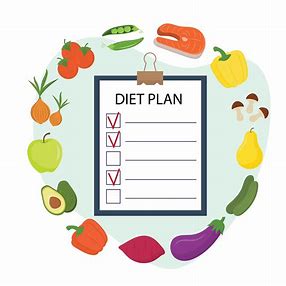Skip to content

Title: The Ultimate Guide to Diet Plans: Tailoring Nutrition for Your Goals and Lifestyle
Introduction
- Overview of the importance of having a personalized diet plan
- Brief explanation of the benefits of a well-structured diet for health and fitness goals
I. Understanding the Basics of Diet Plans
1. What is a Diet Plan?
- Definition and purpose of a diet plan
- The role of diet in maintaining overall health and wellness
2. The Science Behind Dieting
- The role of calories, macronutrients, and micronutrients
- The energy balance equation: Calories in vs. calories out
3. Different Types of Diet Plans
- Overview of popular diet plans: Keto, Mediterranean, Vegan, Intermittent Fasting, etc.
- How different diet plans suit different needs and preferences
II. Key Components of a Diet Plan
4. Macronutrients: The Building Blocks of a Diet
- Carbohydrates: Energy source and types (complex vs. simple)
- Protein: Importance for muscle building and repair
- Fats: Healthy fats vs. unhealthy fats and their impact on health
5. Micronutrients: Vitamins and Minerals
- Importance of vitamins and minerals for overall health
- Common deficiencies and how to address them
6. Hydration: The Forgotten Key to Dieting
- The role of water in digestion, metabolism, and fat loss
- How much water you should be drinking daily
7. Fiber: The Unsung Hero in a Balanced Diet
- The importance of fiber for digestion and satiety
- Sources of fiber and how to incorporate it into your diet
III. Different Approaches to Dieting
8. Weight Loss Diet Plans
- Caloric deficit strategies: How to create one
- Popular weight loss diets: Low-carb, Low-fat, Intermittent fasting, etc.
9. Weight Gain Diet Plans
- Creating a caloric surplus: Healthy ways to increase calorie intake
- High-protein and nutrient-dense foods for healthy weight gain
10. Muscle Building and Fitness Diet Plans
- Protein-rich diet for muscle growth
- Timing meals for optimal muscle repair and growth
11. Special Diets for Medical Conditions
- Diet plans for diabetes, hypertension, and heart disease
- How to manage chronic conditions with diet
12. Vegetarian and Vegan Diet Plans
- Nutritional considerations for plant-based diets
- Key sources of protein, iron, and vitamin B12 in vegetarian/vegan diets
13. Gluten-Free and Allergy-Friendly Diet Plans
- Why people follow gluten-free diets
- Tips for managing food allergies with diet plans
IV. Creating Your Personalized Diet Plan
14. Assessing Your Current Eating Habits
- How to track your current diet
- Identifying areas for improvement
15. Setting Your Nutrition Goals
- Determining your short-term and long-term nutrition objectives
- Aligning your diet plan with personal fitness goals
16. How to Calculate Your Calorie Needs
- Calculating your Total Daily Energy Expenditure (TDEE)
- Adjusting calories for different goals (weight loss, maintenance, weight gain)
17. Planning Balanced Meals
- How to create well-balanced meals using the right portions of macronutrients
- Example meal ideas for breakfast, lunch, and dinner
18. Grocery Shopping and Meal Prep
- How to plan your grocery list to support your diet plan
- The benefits of meal prepping for consistency
V. Tips for Staying on Track with Your Diet Plan
19. Overcoming Cravings and Emotional Eating
- How to manage cravings and emotional eating triggers
- Healthy snack alternatives
20. Dealing with Social Situations and Eating Out
- How to stick to your diet when dining out with friends or family
- Strategies for navigating social events and gatherings without derailing your plan
21. Adjusting Your Diet Plan for Flexibility
- How to make modifications without feeling restricted
- The importance of balance and flexibility in a long-term diet plan
VI. Monitoring Progress and Making Adjustments
22. Tracking Your Progress
- Tools for tracking your diet and physical progress (apps, journals, etc.)
- Key metrics to monitor: weight, measurements, energy levels, and more
23. When to Make Adjustments to Your Diet Plan
- Signs that you need to adjust your calorie intake or macronutrient ratios
- How to adapt your diet as your body changes
VII. Common Diet Plan Mistakes and How to Avoid Them
24. Common Dieting Myths
- Myth: “Carbs are bad for you”
- Myth: “Skipping meals helps with weight loss”
25. How to Avoid Extreme Dieting Pitfalls
- Why extreme dieting can lead to burnout and long-term health issues
- The importance of sustainable, long-term changes over quick fixes
VIII. Conclusion
- Recap of the key components of an effective diet plan
- Encouragement to tailor a diet plan based on individual goals and needs
FAQs
- How do I know which diet plan is right for me?
- Guidance on selecting the right diet plan based on personal goals, preferences, and health conditions.
- Can I follow a diet plan if I have food allergies or intolerances?
- Advice on modifying diet plans to accommodate allergies or intolerances while maintaining nutritional balance.
- How long does it take to see results from a diet plan?
- A general timeline for seeing results based on different goals (weight loss, muscle gain, etc.)
- Should I track calories when following a diet plan?
- Pros and cons of tracking calories and when it’s necessary for achieving specific goals.
- How do I maintain a diet plan during holidays or special events?
- Tips for staying on track during celebrations and events without feeling deprived.

